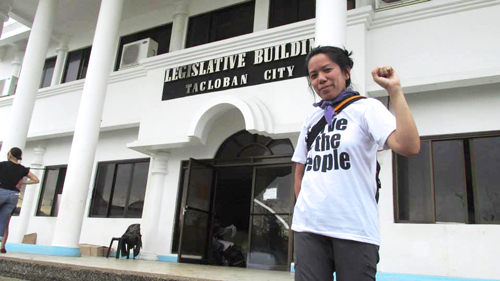By Marino Saito
Northwest Asian Weekly

Precious Butiu (Photo courtesy of Bayanihan Alay sa Sambayanan)
Typhoon Haiyan, one of the strongest storms on record to make landfall, battered the Philippines on Nov. 8. At least 6,100 people in the central Philippines were killed, and another 1,700 are registered as missing.
Two Seattle residents recently returned from Tacloban, an area in the Philippines devastated by Typhoon Haiyan, where they joined relief efforts last November. Precious Butiu of the Seattle-based Filipina women’s organization Pinay sa Seattle, along with visual and spoken word artist Henry Luke, joined one of the first relief efforts by Bayanihan Alay sa Sambayanan (BALSA), a Philippine-based national grassroots alliance, to reach Tacloban with more than 2,000 aid packs and donations. BALSA launched its first relief mission on Nov. 21.
“I wanted to see not only the terrible devastation, but also the inspiring grassroots relief effort organized by Bayan and other mass organizations in order to report back to Seattle with firsthand experience,” Luke said.
Butiu and Luke traveled by van for a day and a half — more than 600 miles over land and water — from Manila to Tacloban. They finally arrived on Nov. 23, along with several other volunteers affiliated with Bayan National, to distribute relief packs and document the effort with photos and videos.
“I was particularly moved by the highly orchestrated and organized efforts to bring relief goods to the people,” Butiu said. “Also, I was shocked at the ongoing devastation, as we drove into the area. There were more people waiting in line than I anticipated, and many people came up to me, even though they didn’t have a voucher.” At that time, 2,000 vouchers were handed out to people who wanted a relief pack, which contained five kilos of rice, canned food, bottled water, cooking oil, biscuits, and mung beans.
The experience was educational to the young volunteers. “Being there, I was able to see firsthand how grassroots organizing through disaster relief actually works. It was an honor to be a part of the relief efforts in the Philippines,” Butiu said.

Henry Luke (Photo courtesy of Bayanihan Alay sa Sambayanan)
“I learned that large scale disaster relief should be and must be organized by the local mass organizations,” added Luke. At the same time, he said he noticed another problem. “Many victims of Typhoon Bopha, which happened 2012, have not received adequate relief still.”
Katrina Pestano, who has been an organizer with Bayan USA Pacific Northwest (Bayan PNW) for eight years, also went to the Philippines last December, along with 23 others from the Northwest, as part of a program to expose Americans to the conditions of marginalized populations and integrate with organizers who are advocating for their rights.
“Last year’s Typhoon Bopha hit very close to my home, less than 100 miles from where my family lives,” said Pestano. “Since then, I have been learning about climate change and mining and resource extraction, and how these have exacerbated the effects of the typhoon.”
Pestano visited a mountain village that was heavily affected by Typhoon Bopha last year. She met indigenous farmers who never received any help from the government there. She noticed that they are still in the process of rehabilitation, rebuilding their school, planting trees and crops, and advocating for their access to government aid.
Their progress is slow. In the Philippines, Pestano said she noticed how important it is for people to keep their hopes and dreams alive. They need to work together to achieve their goals no matter how long it takes.
“I remember the women who had big dreams,” she said. “They told us about their training to become community health workers, while some of them are also finishing up elementary school with their children.
Pestano said the women want to build their own health clinic and high school, since the closest ones are more than three hours away.
“I was so moved by their desire and hard work for a better future for their children, and how they are working on creating that together,” she said.
Butiu, Luke, and Pestano say they will continue to share what they saw, what they felt, and what they did in the Philippines. They want to spread awareness of the ongoing plight of the typhoon victims, so more people will volunteer or donate.
Another group, Kaya Collaborative, will be sending 12 youths to the Philippines this summer. They are currently recruiting Filipino American youth, students, and recent graduates to participate in a fellowship that aims to connect the Filipino diaspora to long-term development in the country, including areas affected by the typhoon. The fellowship application is open until Feb 10.
The group will be there for 10 weeks from mid-June to mid-August.
Kaya Collaborative is a nonprofit initiative born out of conversations about social innovation and development between students at Harvard and Brown University in summer 2013. It has since spread its roots across the United States, reaching communities of Filipino Americans along the West Coast, in the Bay Area, and here in the Pacific Northwest. The mission of Kaya Collaborative is to engage the worldwide Philippine diaspora to achieve self-sustaining homeland development. (end)
For more information, contact Daniel Griffith, the Pacific Northwest Regional Director, at daniel.buenafegriffith@gmail.com. To apply for the fellowship, please visit http://www.kayaco.org/fellowship.
Marino Saito can be reached at info@nwasisanweekly.com.



